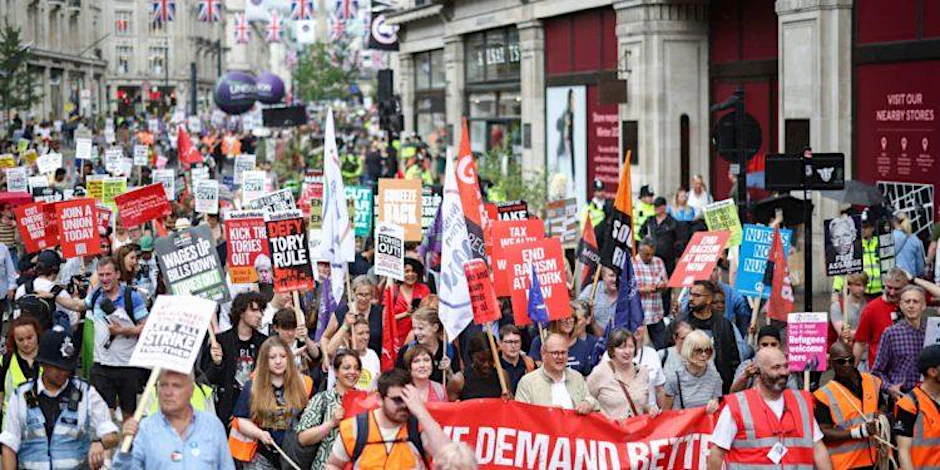
The government’s Strike (Minimum Service Levels) Bill is “a full-frontal attack on working people and the trade unions they organise within.” say Unison in an article ‘Three things you need to know about the anti-strike bill.’
Since 1980, there have been no less than fourteen employment and trade union acts, restricting and then to a degree, clawing back trade union rights. That’s forty years of successive Governments playing ‘tug of war’ with the rights of ordinary workers.
New restrictions for workers as MPs break the rules
It must be gutting for those on the frontline of our public services to see one story after another about MPs, who earn over £80k, breaking the rules, whilst their own democratic right to go on strike for fair pay, is being removed.
We’ve seen the scandal of Partygate when twelve gatherings were investigated by the Met Police and fines issued to then Prime Minister Boris Johnson, his wife Carrie and Rishi Sunak.
Apparently not learning the lesson about politicians not being above the law, in the last week we’ve seen the prime minister fined for not wearing a seatbelt, and Nadhim Zahawhi fined by HRMC over his tax affairs.
But it’s not just cabinet ministers who are putting the credibility of parliament to the test. There’s a growing list of MPs facing accusations of wrongdoing or under investigation by the police or parliamentary authorities.
The cross-party collection of MPs currently suspended from their party is in double-figures. There are now more independent MPs sitting on parliament’s naughty step than there are Liberal Democrats. Their wrongdoings range from allegations of racism, sexism and harassment to drug use and bullying.
A mistake can cost you your job, but an MP needs a year in jail
Whilst we can agree that someone is innocent until proven guilty, you may be surprised to learn that unless an MP is jailed for a year or longer they can hang onto their job and remain in parliament – even if their party chooses to kick them out.
It may be news to some, that a misdemeanour that could cost a public sector worker their job, allows an MP to continue as before; even without a party whip. Ironically, they can end up with greater political freedom as independents and are in line for a redundancy payment if they stand and lose their seat at the next general election.
At the same time, Unison points out that the latest anti-trade union legislation working its way through parliament removes protection for striking workers. If a work notice requires that an employee works during a strike, they could be sacked if they refuse. Frontline workers will face dismissal for taking part in lawful industrial action.
The bill is now at committee stage in the House of Commons and the Tory majority will enable it to sail through. A Tory majority gained on less than half the vote at the last General Election.
UNISON’s Christina McAnea said:
“UNISON members want the government to focus its efforts on fixing the pay crisis and solving the legitimate disputes that have led to recent strike action. Only then will the crises in our public services start to be solved. Instead, the government is attacking workers and making it even harder for them to win fair pay.”
The union argues that the bill “seeks to drastically curtail labour rights in Great Britain and allows employers to sack the very people on whose hard work and goodwill our public services depend.”
Our politics has distorted values and our laws are fast moving in the wrong direction for working people. Those same public sector workers we clapped during the pandemic can be sacked, whilst those who make the rules in parliament, can break them seeminly without consequence. It’s time for change and a switch to a fairer voting system could make huge difference.
First Past the Post gives the Conservatives the power to remove our rights
Under First Past The Post (FPTP) elections are fought in just a small number of marginal (swing) seats. The number of those seats is in decline, meaning there are very few seats ‘up for grabs.’
The electoral system now substantially favours the Conservative Party and works against Labour. This means even with an equal number of votes, Labour is likely to lose to the Conservatives.
The smaller parties that favour electoral reform tend to be aligned more closely with Labour. This means Labour stands to gain from changing the system but is being punished under the current one.
Analysis of the 2021 English local elections shows more candidates being fielded from the left of centre, than the right. Conservatives are dominating the right of politics whilst the left of centre parties are competing with each other.
Calls for change are growing louder in the Labour movement, with Aslef, Bakers, FBU, Musicians, PCS, Prospect, TSSA, Unison and Unite all supporting electoral reform.
Join the Politics for the Many campaign and get a voting system that works for working people.